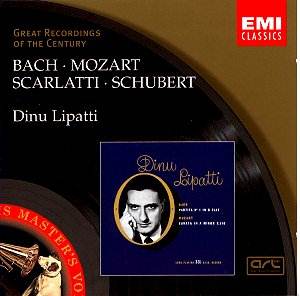The other day I was reading some negative comments
about the artistry of Dinu Lipatti on an Internet classical music
discussion site. In essence, these comments implied that Lipattiís
lack of greatness would have been recognized if he had not died
at an early age from leukaemia.
Thinking those comments rather odd and even nasty,
I consoled myself by playing a few of his recordings that I have
in my music library which really just consists of a number of
closets and one large entertainment center. From my perspective,
Lipatti is one of the greatest pianists of the 20th
century, and this distinction comes from his innate sense of musical
structure, flow, and equilibrium. When listening to his performances,
you wonít be amazed at his virtuosity or lifted to new heights
of rapture and understanding of the human condition. However,
listen to a multi-movement work in one sitting, and his wonderfully
cohesive flow should eventually hook you into his presentation
of a composerís soundworld.
Perhaps the strongest praise I can give Lipatti
is that his interpretations always sound just right, even when
I know there are alternative performances more in my preferred
pleasure zones. A perfect example is his recording of Bachís Partita
No. 1 in B flat. I love the slow versions from Rosalyn Tureck/Philips,
Andrew Rangell/Dorian, and Wolfgang Rübsam/Naxos for their
attention to detail, originality, and depth of expression. The
much quicker Angela Hewitt/Hyperion performance is also treasured
for its rhythmic bounce and playful nature.
Lipattiís performance is as quick as Hewittís,
but doesnít have nearly the bounce or vibrancy. As for emotional
depth, heís light years behind Rübsam, Tureck, and Rangell.
Yet, I keep playing his version, and thoughts of other pianists
simply disappear. His interpretation of Bachís music works on
flow and structure, and there isnít another recorded version that
conveys the rock-solid coherency offered by Lipatti. We often
hear about music played in a natural manner, and Lipatti is surely
its role model.
His Partita in B flat takes less than eighteen
minutes to traverse and is a no-nonsense performance. Detours
from the main road are minimal, as Lipatti concentrates on the
development and completion of the architecture. I canít
even say that heís particularly exciting when flying through a
fast piece such as the 2nd Movement Allemande. Regardless,
it all feels right and perfectly balanced.
Lipatti plays the four Bach arrangements in compelling
fashion, particularly the Busoni arrangement of the Chorale Prelude
BWV 599. This is one of my favorite Bach Chorale Preludes, and
Lipattiís sonority and sense of inevitability amazingly equals
the best organ versions. Further, he conveys a highly determined
projection of human aspiration, and that is the crucial emotional
theme of the piece.
Many pianists play Scarlattiís keyboard music
with a smooth legato and deficient rhythmic bounce to the extent
that Scarlatti would hardly recognize his own creations. Fortunately,
Lipatti will have none of that. His Scarlatti is perky and delightfully
playful. Just one hearing of the Sonata K. 380 informs us that
Lipatti can be as delicate and whimsical as the best harpsichord
players in this repertoire.
Lipattiís performance of Mozartís Sonata in A
minor is among the best on record. I previously mentioned Lipattiís
keen sense of architectural balance, and Mozartís music thrives
on excellent balance. When listening, note the elegance Lipatti
imparts to the 2nd Movement Andante and the signs of
impending danger in his interpretation of the 3rd Movement
Presto. To Lipatti, Mozart is much more than lovely melodies strung
out in smooth and pretty displays; he recognizes the seething
emotions below the surface, and balances them expertly with his
graceful and optimistic caressing of notes.
Lipatti concludes the recital with outstanding
readings of two Schubert Impromptus. The drama and tension he
injects into the Impromptu in G flat are uncommon and absolutely
stunning, while his Ďrunsí in the E flat are expertly balanced
and exciting.
As for sound quality, it is never less than acceptable
although three different venues are utilized. The Scarlatti pieces
carry the greatest aural debris, but Lipattiís irresistible music-making
easily makes one forget such matters.
In summary, I canít stress enough the advantage
of playing this Dinu Lipatti recording straight through from start
to finish. Only in this fashion does Lipattiís artistry fully
emerge. Although the program features four very different composers,
Lipatti serves notice that he is thoroughly grounded in their
separate soundworlds as if he changes his personality from one
composer to the next. Lipattiís unaffected pianism is always at
the service of the composition. EMI hails this disc as one of
its "Great Recordings of the Century", and I have no
doubts as to the accuracy of the title. Lipatti enthusiasts certainly
already have the recording in their libraries from previous reissues.
Those not familiar with the manís artistry should waste no time
in acquiring a disc which is essential for all keyboard fans.
Consistently noble, sensitive, assertive, and penetrating, Lipatti
shows us that superb pianism and total immersion in a composerís
psychology can be an ideal match. That he succeeds with every
composerís music he plays is an accomplishment few pianists ever
attain.
Don Satz
